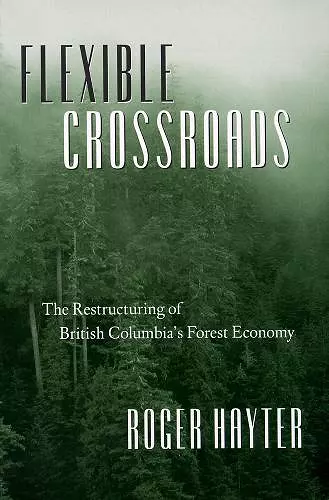Flexible Crossroads
The Restructuring of British Columbia's Forest Economy
Format:Paperback
Publisher:University of British Columbia Press
Currently unavailable, and unfortunately no date known when it will be back

Flexible Crossroads makes a significant contribution directly to economic geography -- and indirectly to the field of forestry economics ... I regard it as a regional research volume that will become a classic. -- R.G. Ironside, Professor Emeritus, Department of Earth and Atmospheric Sciences, University of Alberta The manuscript is a highly significant contribution to economic geography, political economy, regional development, forestry economics, and resource management ... It is a welcome addition to a vibrant and fruitful debate on forest policy issues in BC from which the global community could learn a great deal. -- L. Anders Sandberg, Faculty of Environmental Studies, York University
Columbia's forest economy is at a crucial crossroads, and Flexible Crossroads looks at the contemporary restructuring of British Columbia's forest economy, demonstrating how both resource dynamics and industrial dynamics have shaped this transformation.
British Columbia's forest economy is at a crucial crossroads. Its survival, Roger Hayter argues, rests on its ability to remain flexible and open to innovation -- a future by no means assured given recent policy initiatives and the current contested nature of British Columbia's forests.
Flexible Crossroads looks at the contemporary restructuring of British Columbia's forest economy, demonstrating how both resource dynamics -- the transition from old growth to managed forests -- and industrial dynamics -- changing technology and global market forces -- have shaped this transformation. Conceptually, the restructuring is portrayed as a shift from a commodity-based, cost-minimizing production system (Fordism) to a more product-differentiated, value-maximizing production system informed by the imperative of flexibility.
The first part of the book provides global and historical perspectives by situating British Columbia's forest economy within the wider context of global industrialization, the history of resource dynamics, and the current shift from Fordist to more flexible systems of production. In the second part, Hayter assesses the extent to which British Columbia's forest economy is enacting this shift by focusing on factors such as foreign ownership, the strategies and structure of MacMillan Bloedel, the role of small firms, trade relations, employment and labour relations, forest community development, environmentalism and resource use, and innovation policy.
Flexible Crossroads will appeal to geographers, political economists and forestry professionals, as well as to students of British Columbia's economy and forest economies generally.
Hayter offers a comprehensive and well-written treatise on the economic geography and history of the "forest economy" of British Columbia. He expertly describes the difficult conflicts between logging, jobs, people, indigenous people, and old growth. -- D.F. Karnosky * Choice *
- Short-listed for Harold Adams Innis Prize, Canadian Federation for the Humanities and Social Sciences 2002 (Canada)
ISBN: 9780774807760
Dimensions: unknown
Weight: 660g
448 pages